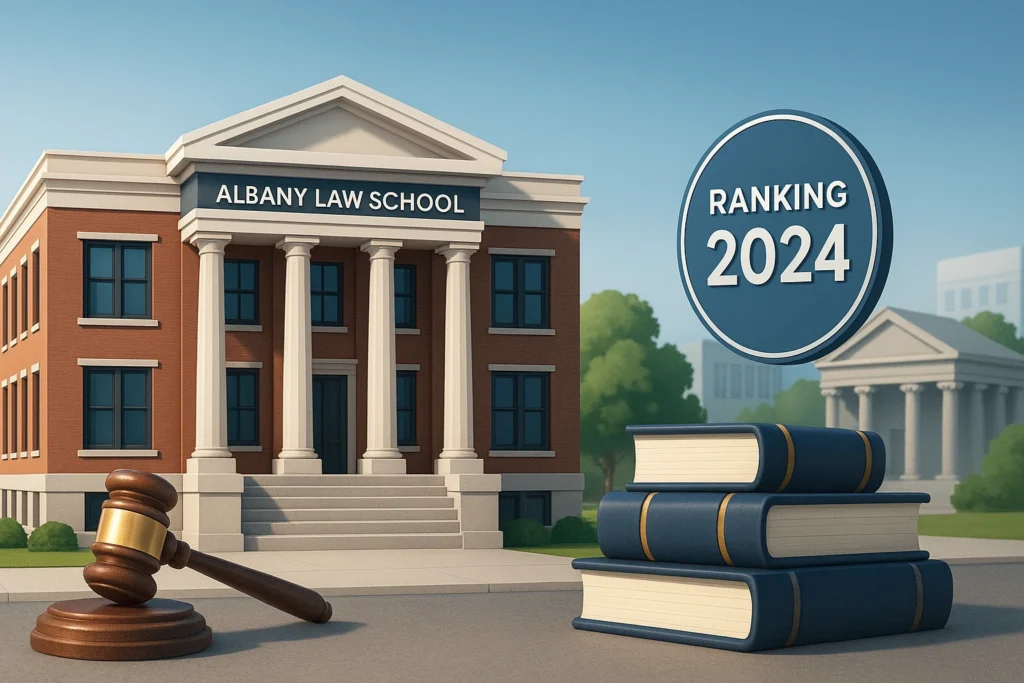Choosing the right law school takes time. You want a place that offers strong training, solid career paths, and a respected name.
Albany Law School often comes up for students who want to work in government, public service, or the legal system of New York. But how does it rank compared to others?
This school has a long history and sits in the capital of New York. It gives students close access to courts, state offices, and real-world legal work. Still, not every law school fits every goal.
This article breaks down Albany Law School’s ranking, reputation, and what it offers so you can decide if it’s the right choice.
Where Albany Law School Ranks Today
Albany Law School ranks around the middle among U.S. law schools. In the 2024 U.S. News & World Report, it stood at #105.
This means it does not compete with the top law schools in the country. Still, a ranking above 100 shows that the school meets national standards and gives a full legal education.
Though the number may seem average, rankings don’t always show the full picture. Some law schools focus on elite firms. Others focus on public service.
Albany Law falls in the second group. That’s why its ranking in areas like government law or health law stands out more than its overall score.
PreLaw Magazine rated Albany Law School #1 in the nation for government law. That puts it ahead of schools that rank higher overall.
So, if you want to work in public policy, state government, or legal reform, this ranking matters more than the broad list.
How U.S. News Measures Rankings
U.S. News uses many numbers to rank law schools. These include test scores, bar pass rates, job outcomes, and peer reviews.
Albany Law scores well in some areas, but it also has limits. It may not offer the same level of national reach or top firm access that higher-ranked schools offer.
The school’s bar passage rate is strong. In 2023, about 83% of first-time takers passed. That means most students finish school ready to enter the legal field.
The school also shows good results in graduate employment, especially in state jobs or local firms.
Peer review and national visibility affect rankings, too. Albany Law may not have the same name power as Harvard or Columbia.
But it serves a focused group, those who want to work in New York law or public service. That keeps its core mission clear, even if it lowers its broad rank.
Albany’s Strength in Government and Public Service
One key reason students pick Albany Law is its strength in public law. The Government Law Center links students with real state cases, policy research, and legislative tools.
Since the school sits in Albany, students can walk from class to the State Capitol. This kind of access adds value that no ranking chart can fully show.
The school has earned high marks from legal magazines in recent years. PreLaw Magazine, a branch of The National Jurist, often places Albany Law among the best in health law and public policy.
These rankings focus on how well a school prepares students to serve the public.
Students also benefit from special clinics. These clinics place them in legal settings where they help real people.
They may help in courts, with veterans, or in housing rights. This hands-on work builds skill and character, both key in public law roles.
What the Ranking Means for Job Seekers
Albany Law grads do well in certain job markets. Many go into roles in the New York court system, state agencies, or small firms.
These jobs may not carry high national salaries, but they offer steady careers and strong community ties. This is one reason why public interest students often look past national ranks.
Most rankings put weight on how many grads work at large firms or earn high salaries. Albany Law doesn’t send many students into those roles.
That’s why its rank stays in the middle. But in New York state government and local firms, the school has a clear name and a strong network.
If your goal is to work at a large firm in a big city like Los Angeles or Chicago, the school may not give the boost you want.
But if your dream job sits in a courtroom or legal office in New York, the ranking should not stop you. Local reputation often matters more than a number on a national chart.
What Makes Albany Law Unique
Location plays a big role in Albany Law’s value. You can study a few blocks from real courts, public offices, and legal groups.
Students don’t just learn law they see it in action. This exposure helps them gain confidence and insight before they even pass the bar.
The school stays small. Class sizes let students get to know their professors and build lasting relationships. You don’t get lost in a crowd.
Faculty members often work in the same legal fields students hope to enter. That creates a natural path from classroom to career.
Cost matters too. Albany Law may cost less than some private schools ranked higher. It also gives merit aid and scholarships.
Students who keep strong grades can save money and graduate with less debt. That helps make public service careers more realistic.
Comparing Albany Law to Other New York Schools
New York has many law schools. Some sit at the top of national lists. Others focus on special paths like tech law or social justice.
Schools like NYU or Columbia rank high but also cost more and come with strong competition. Albany Law stands out for access, location, and its government law focus.
In-state students may also feel at home faster. The city of Albany is smaller than New York City, so housing and travel cost less.
That can make a big difference over three years. You also spend less time commuting and more time gaining experience.
If you want to work in New York but not in a giant city, Albany Law may fit. The school builds ties with courts, legal clinics, and agencies all across the state. These ties can help when you need an internship or reference.
Bar Exam Results and What They Show
Bar results give a clear sign of how well a law school trains its students. Albany Law’s 83% bar passage rate is solid.
That means most students leave ready to work. Some schools with higher ranks do not match that score.
Passing the bar matters more than school prestige. Without it, you can’t practice law. Albany Law takes this seriously.
It offers review programs, extra help, and one-on-one feedback to help students pass the first time. That kind of support adds real value.
Strong bar scores also help rankings. Over time, if those scores rise, the school’s rank may go up, too.
But even now, they show that the school gets results. A steady pass rate proves that students are learning what they need.
Bottom Lines
Albany Law School does not rank at the top of national lists. But that does not mean it falls short. It serves a clear purpose and meets real needs.
If you want a law school that focuses on public service, state law, or courtroom work in New York, this school has much to offer.
Its rank around #105 may look modest. Still, that number hides key strengths such as its top spot in government law and its strong bar pass rate.
The school gives real-world access, close faculty support, and focused legal programs.
In the end, the right law school depends on your goals. Rankings help, but they are only part of the story.
Albany Law School may not shine on every chart, but it opens the door to a legal life that many people seek.
Disclaimer:
This content is for general education. Do not take it as legal or career advice. Always verify details with official law school sources.



